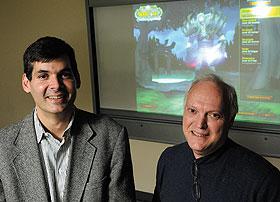  |
| HOME | THIS ISSUE | CALENDAR | GRANTS | BACK ISSUES | < BACK | NEXT > |
Courses examine videogaming as artistic medium, cultural pursuitby David Bauman - November 17, 2008
|
||||
| The fine line between gaming for fun and gaming to learn continues to blur, thanks in part to Roger Travis, who hopes to build on the use of videogames in his courses at UConn to bring about a new online community called The Video Games and Human Values Initiative. During winter intersession, Travis, an associate professor of modern and classical languages in the College of Liberal Arts and Sciences, will offer Living Epic, a two-week online course, on a pilot basis through the College of Continuing Studies. He will follow up in spring 2009 with Gaming Homer, an undergraduate credit course for classics majors and other interested students that is a version of his course on Homer. Both courses will take an innovative view of gaming and its effects on participants, and involve in-game class work in the form of in-game laboratories and in-game discussions. They will also involve contact with the people who are creating the games examined and analyzed in the courses. “I have directed these courses at students who want to think about videogaming in a new way,” says Travis. “We are going to examine video games as an artistic medium and argue that videogaming is a worthwhile cultural pursuit.” Travis is a pioneer in using the pizzazz of video games in his classes to help make complicated material — epic poems from antiquity — more understandable and entertaining. Capitalizing on students’ appetite for electronic games, he compares the heroic hyperbole and values represented in such classical epics as the Iliad and the Odyssey to that in games like Halo and Grand Theft Auto, to demonstrate that while videogaming is relatively new, the power to exert broad cultural influence is as old as Homer and Achilles. “We can learn the same kinds of things about ourselves from playing adventure video games attentively as we can learn about the ancient Greeks and Romans from reading their epics carefully,” says Travis. Although video games have grown to great cultural prominence, there has been little analysis of the relationship between games, society, and culture. For many teachers and parents, video games are full of menace and are a symbol of teenage sloth. Yet at the same time, video games and the culture that surrounds them are becoming very big news.
More than 45 million American homes now have video game consoles, and U.S. sales of videogame hardware and software rose 57 percent this year, with sales of $1.7 billion. A recent study by the University of Michigan found that by age 21, the average youth has played 10,000 hours of video games. “Our research suggests teachers and principals simply do not play, and therefore do not understand, multiplayer online games and thus have difficulty even imagining how they could help teach math, science, second languages, or the classics,” says Michael Young, an associate professor of educational psychology in the Neag School of Education who is collaborating with Travis. In his course on Serious Games in Education, Young’s graduate students explore the possibilities of virtual worlds for supporting what Travis knows, that serious content and serious gaming can be fun and educational. Travis and Young hope the Initiative will bring together scholars and students in the humanities, the social sciences, education, computer science, and business to consider “the place and extraordinary potential of video games in our culture,” provide a (virtual) place for scholarly research into the relation of video games to values, and offer online courses taught by fellows from various different disciplines. “We believe that video games’ greatest innovations in education, business, the social sciences, the humanities, and most of all in games themselves will arise from a deeper understanding of games’ connections among all these disciplines,” says Travis. “When scholars and students alike understand these connections better, they will be better prepared to advance the state of gaming as it relates to their own fields.” |
| ADVANCE HOME UCONN HOME |

